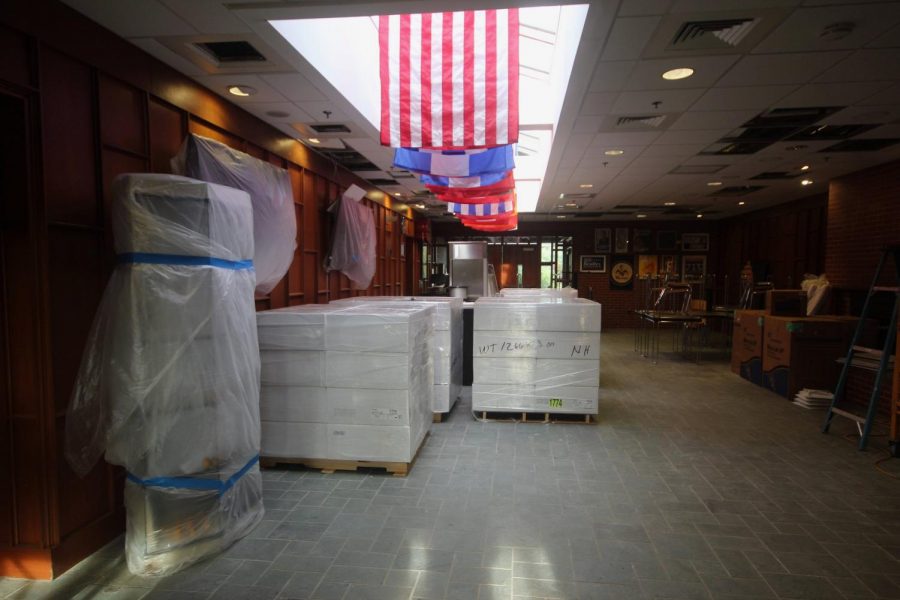Summer heat leads to mold infestation, NHIOP to reopen next week
NHIOP’s cafe and auditorium were the first areas of the building to be cleaned to make room for the upcoming political debates.
September 18, 2018
At the beginning of the school year students who, after dedicating their summers to various internships and jobs, arrived back on campus ready to start classes might have run into an unexpected surprise; that the chief building where classes usually were held was closed due to a mold infestation.
Since mid-August, the college’s New Hampshire Institute of Politics, or NHIOP, has been closed due to a sudden infestation of mold. As a result of the mold mitigation efforts, which are ongoing, members of the politics faculty and students with classes in the Institute alike have rapidly been relocated into available office and classroom spaces scattered across the campus.
Surprisingly, such shuffling of classes from the air-conditioned halls of the NHIOP to the (somewhat) warmer rooms of buildings like Alumni has transpired without much fuss; in fact, it has provided some unexpected benefits.
Cameron Lapine, a senior politics major who usually has classes in the Institute, commented in a discussion with Crier staff that although his new class on the fourth floor of Alumni was a “little warm” to what he would like it to be, because he lives in Benard Courts his walk to the class is now much shorter. Mr. Lapine continued to say that despite the unexpected change in location, his classmates haven’t had much to complain about it.
Although the surprise transition to a different classroom hasn’t been very dramatic for students, the story is slightly different for professors.
One professor in the politics department commented to the Crier that despite all the reshuffling, having to work in areas like the library has actually made them more accessible to students who need assistance. For example, the professor noted that since colleagues frequent the coffee shop more often (both to work and to eat-something they usually do via the Institute’s cafe) meeting students who need help with classes is actually much easier because professors are more likely to be in spaces students can easily frequent.
When asked how professors are able to access printers or copies (which was not an issue in the NHIOP) on an as-needed basis,the professor gave credit to both the administrative assistant in Dana and the Dean for going out of their way to give politics professors easy access to these essential office machines. Although another politics professor noted that not having a dedicated office space makes work difficult (for example, the lack of dedicated office space may make organization of research materials difficult) said professor was extremely grateful for both the college’s quick response and expenditure of effort to find professors workspace.
And according to Dean of the College Mark Cronin, although having the professors immediately help relocate their office spaces “was a challenge for them, I think that’s fair to say,” that said faculty “deserve a lot of the credit” for the seamless shuffling of work and class spaces, largely due to their good will and terrific cooperation.
In terms of the actual mitigation efforts, the initial response to the infestation seems to have been as seamless as the transition of office spaces for the faculty. According to Vice President of Facilities William Furlong, when Physical Plant was notified on the 16th of August of mold existing in the ceiling and HVAC vents, the mold mitigation company “Soil Away” was on site the next day to help tackle the problem. Industrial hygienists who examined the mold concluded that, despite its expansive presence, it “was new growth”, and therefore hadn’t been there for a long time.
Despite having to replace every ceiling tile in the Institute, the ability for the NHIOP to host events hasn’t really been affected. In fact, Mr. Furlong noted that WMUR “has been using the facility…for their local and state debates.” And as noted by recent event staffer/politics major Margaret McSherry, despite the presence of scaffolding (indicating work still being done) staffers were able to enjoy pizza in the “West Wing”-an indication of just how far mitigation efforts have come.
Although the school is working with insurance to determine the total cost of repairs, Mr. Furlong commented that “we [the college] build in a contingency for [such] events.”
Dean Cronin credited Mr. Furlong and the repair crews for tackling the problem “with clear eyes” and that everyone involved, from library staff to the “people and space” of the new student center did a great job of communicating about the problem early. He noted that honest and direct communication not only makes others want to work together, but quickly provides the best possible result.
Ultimately, the Dean noted that the unusual summer heat and humidity was a likely catalyst, making it the first mold infestation he has seen in his thirty-year career at Saint Anselm College.
The NHIOP will be reopened on September 17th, 2018.



